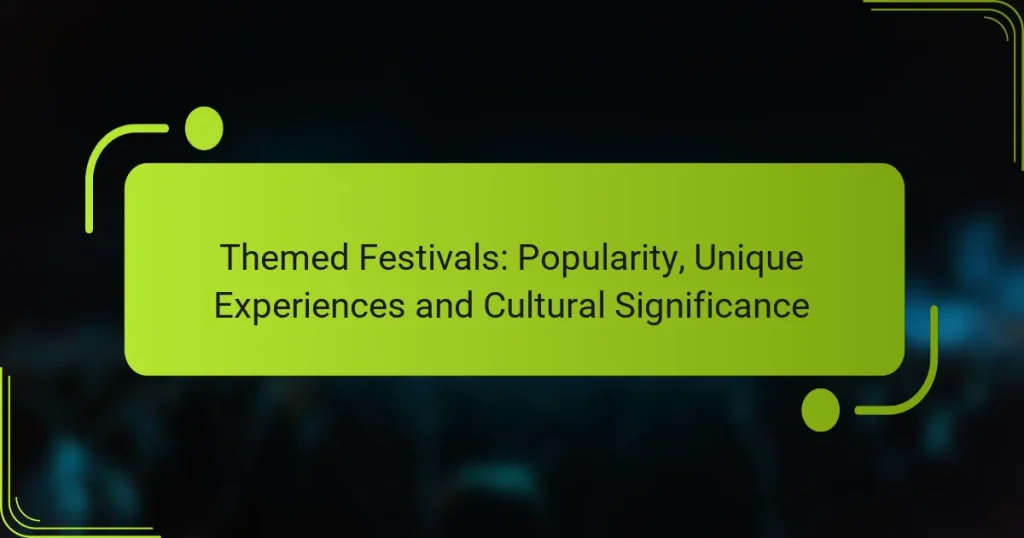Themed festivals in the United States draw millions of attendees annually, celebrating diverse aspects of art, music, and cultural heritage. These events not only offer immersive experiences that highlight local traditions but also play a crucial role in boosting local economies by attracting visitors and generating revenue across various sectors.
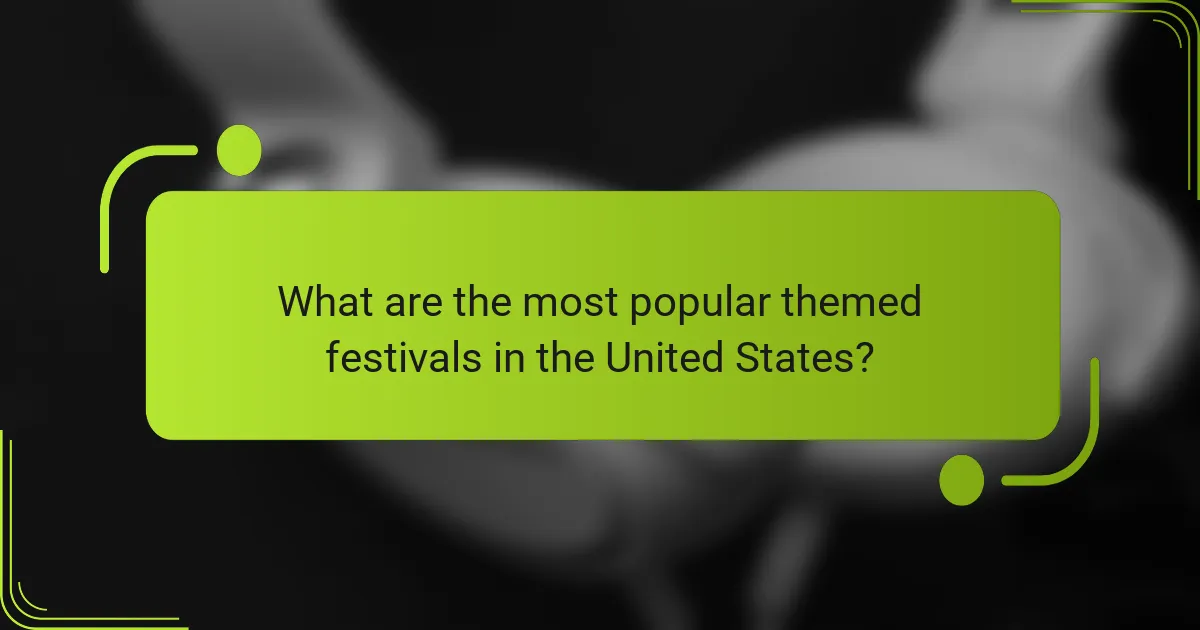
What are the most popular themed festivals in the United States?
The United States hosts a variety of themed festivals that attract millions of attendees each year, celebrating everything from art and music to cultural heritage. These festivals offer unique experiences that reflect local traditions and foster community engagement.
Burning Man
Burning Man is an annual event held in the Black Rock Desert of Nevada, where participants create a temporary city dedicated to art, self-expression, and community. The festival culminates in the burning of a large wooden effigy, symbolizing the spirit of creativity and impermanence.
Attendees, known as “Burners,” are encouraged to embrace principles like radical self-reliance and communal effort. Tickets can be pricey, often ranging from $400 to $1,500, so planning ahead is essential for those wishing to attend.
New Orleans Mardi Gras
Mardi Gras in New Orleans is a vibrant celebration known for its parades, masquerade balls, and lively street parties. This festival, which takes place before Lent, showcases the city’s rich cultural heritage through music, food, and colorful costumes.
Visitors can enjoy traditional foods like king cake and gumbo while participating in various events. It’s advisable to book accommodations well in advance, as hotels fill up quickly and prices can soar during the festival season.
Coachella Valley Music and Arts Festival
Coachella, held in Indio, California, is one of the largest music festivals in the U.S., featuring a diverse lineup of artists across multiple genres. The festival is also known for its impressive art installations and fashion-forward attendees.
Tickets typically sell out fast, often costing several hundred dollars, so early purchase is recommended. Attendees should prepare for hot desert weather and consider camping options for a more immersive experience.
Oktoberfest in Munich
While Oktoberfest is primarily celebrated in Germany, many cities in the U.S. host their own versions, particularly in places with large German-American populations. These festivals feature traditional German beer, food, and music, creating a festive atmosphere.
Visitors can enjoy pretzels, bratwurst, and a variety of beers while participating in games and activities. It’s best to check local schedules and arrive early to secure a good spot, as these events can draw large crowds.
South by Southwest (SXSW)
SXSW is an annual festival in Austin, Texas, that celebrates music, film, and interactive media. It attracts industry professionals and enthusiasts alike, providing a platform for emerging artists and filmmakers to showcase their work.
Attendees can purchase badges that grant access to various events, panels, and performances. Planning is crucial, as the festival spans several days and requires navigating a busy schedule of activities and venues.
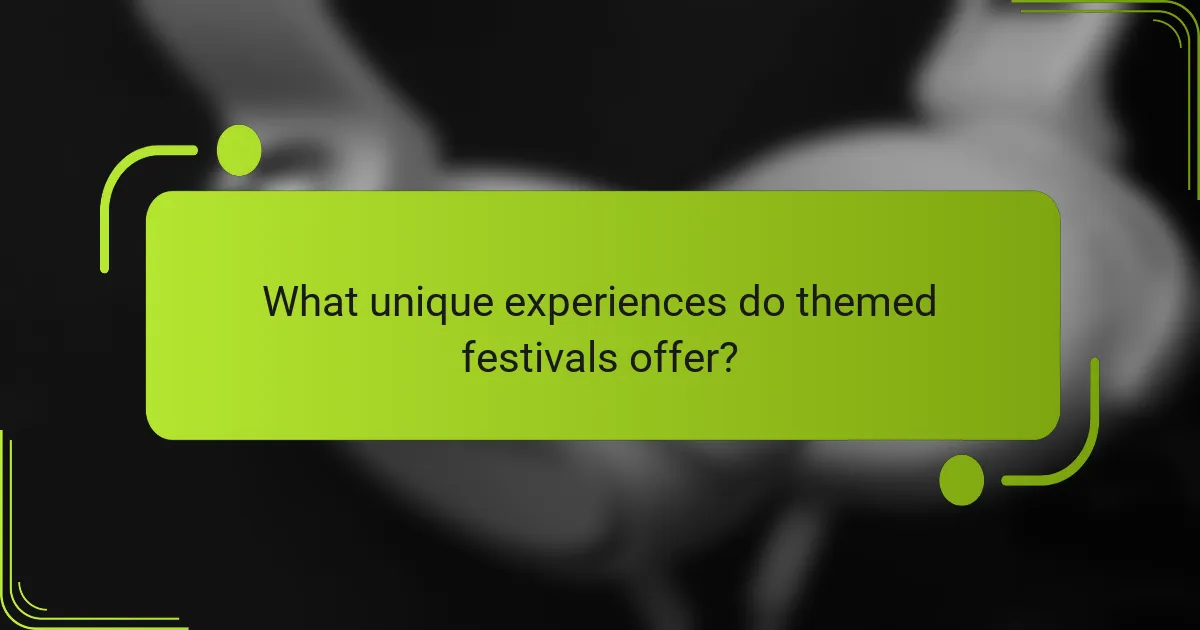
What unique experiences do themed festivals offer?
Themed festivals provide a variety of unique experiences that immerse attendees in specific cultural, artistic, or culinary themes. These events often feature interactive elements, performances, and activities that engage participants and create memorable moments.
Interactive art installations
Interactive art installations invite festival-goers to engage with the artwork, often allowing them to contribute to or alter the piece. This hands-on approach fosters creativity and encourages personal expression, making art accessible and enjoyable for everyone.
Many festivals feature large-scale installations that can be explored, such as immersive environments or digital displays. Attendees can often participate in creating temporary art pieces, enhancing the communal aspect of the festival experience.
Cultural performances and parades
Cultural performances and parades showcase traditional music, dance, and storytelling, providing insight into various cultures. These events often highlight local talent and heritage, allowing attendees to appreciate the diversity of artistic expression.
Parades may include colorful costumes, floats, and live music, creating a festive atmosphere. Festivals often schedule performances throughout the event, ensuring that visitors can experience a range of cultural expressions during their visit.
Gastronomic adventures
Gastronomic adventures at themed festivals offer attendees the chance to explore diverse cuisines and culinary traditions. Food stalls and trucks typically feature local specialties, international dishes, and innovative fusions, catering to a wide range of tastes.
Many festivals also host cooking demonstrations and tastings, allowing visitors to learn about the ingredients and techniques behind the dishes. This interactive dining experience enhances appreciation for food and encourages attendees to try new flavors.
Workshops and hands-on activities
Workshops and hands-on activities provide opportunities for attendees to learn new skills related to the festival’s theme. These sessions can range from crafting and cooking to dance and music, enabling participants to engage deeply with the subject matter.
Many festivals offer workshops led by experts or local artisans, making them accessible for all skill levels. This interactive learning approach not only enriches the festival experience but also fosters a sense of community among participants.
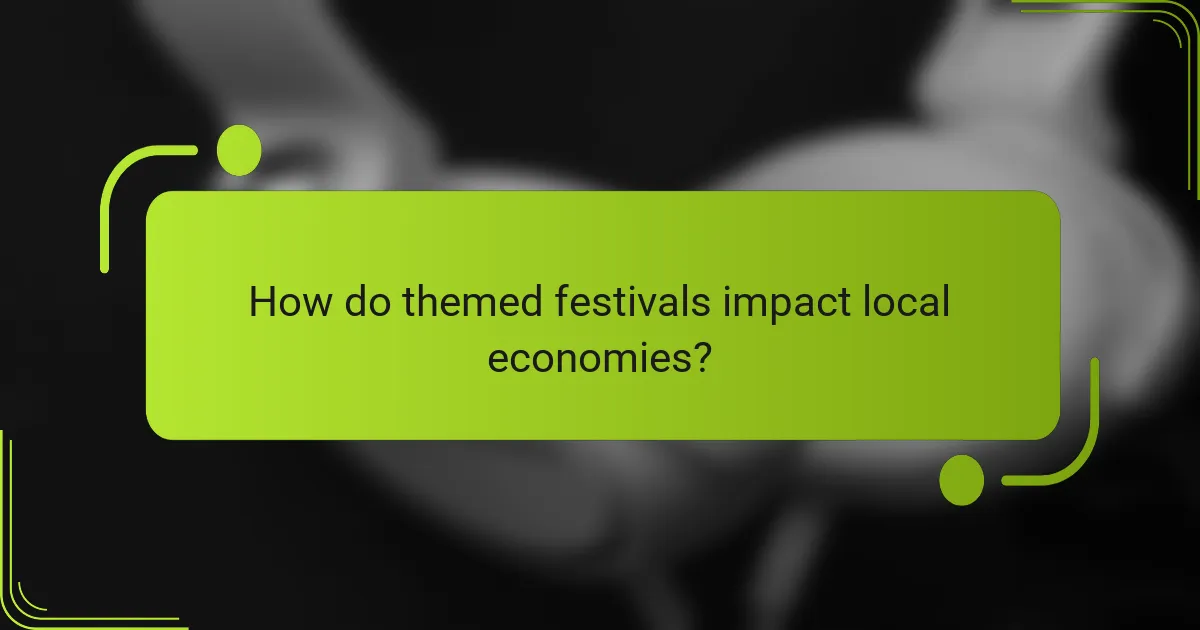
How do themed festivals impact local economies?
Themed festivals significantly boost local economies by attracting visitors and generating revenue. These events create a ripple effect, benefiting various sectors such as tourism, hospitality, and retail.
Increased tourism revenue
Themed festivals draw tourists from both nearby and distant locations, leading to increased spending on accommodations, food, and entertainment. For instance, a music festival may see attendees booking hotels and dining at local restaurants, contributing thousands of dollars to the local economy over a weekend.
Local governments often report substantial increases in tourism revenue during festival periods, sometimes ranging from 20% to 50% compared to non-festival times. This influx can help fund community projects and infrastructure improvements.
Job creation in hospitality
As themed festivals approach, the demand for hospitality services rises, leading to job creation in areas such as hotels, restaurants, and event management. Seasonal positions may be filled by local residents or students, providing them with valuable work experience.
In some cases, festivals can lead to permanent job growth in the hospitality sector as businesses expand to accommodate increased visitor numbers. This can result in a more robust local job market and reduced unemployment rates.
Boost to local businesses
Local businesses, from artisanal shops to food vendors, often see a surge in sales during themed festivals. These events provide a platform for small businesses to showcase their products and attract new customers, which can lead to long-term loyalty.
Additionally, festivals may encourage collaboration among local businesses, such as joint promotions or bundled offerings, further enhancing their visibility and profitability. This cooperative spirit can strengthen the local economy and foster a sense of community among business owners.
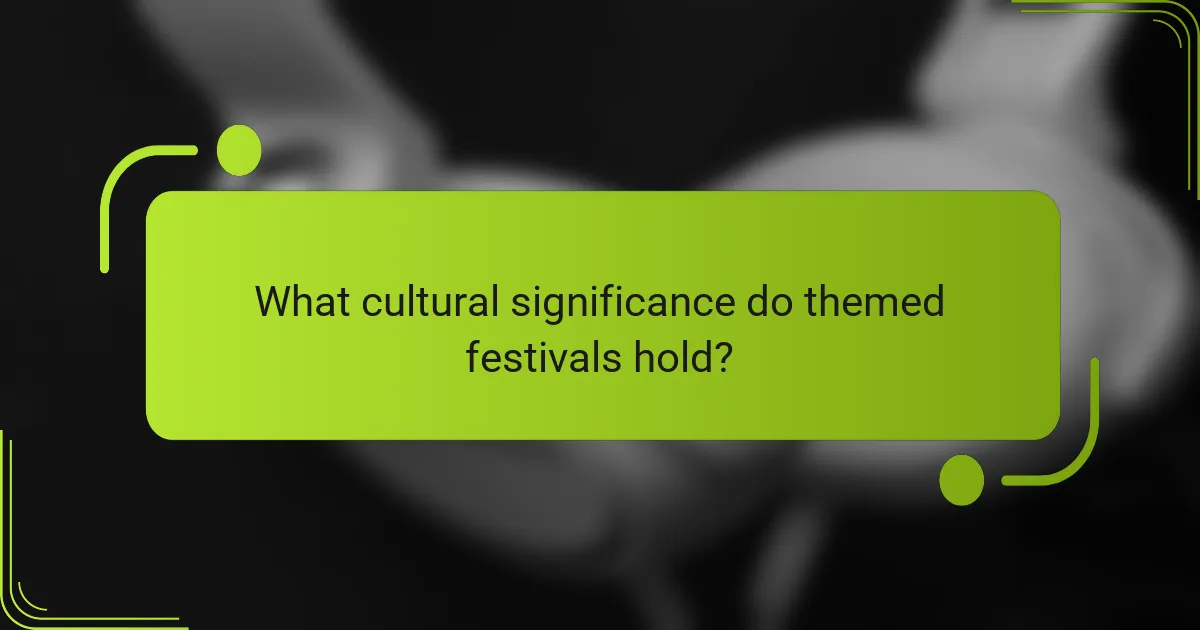
What cultural significance do themed festivals hold?
Themed festivals play a crucial role in celebrating and preserving cultural heritage, fostering community ties, and facilitating cultural exchange. These events not only showcase unique traditions but also create spaces for shared experiences and understanding among diverse groups.
Preservation of traditions
Themed festivals serve as a vital means of preserving cultural traditions that might otherwise fade away. By showcasing traditional music, dance, crafts, and cuisine, these events keep historical practices alive and relevant for new generations. For example, festivals centered around harvests or religious observances often include rituals that have been passed down through centuries.
Communities can actively participate in these traditions, reinforcing their cultural identity. Engaging local artisans and performers in festivals ensures that traditional skills and knowledge are not only maintained but also celebrated.
Community building and identity
Themed festivals foster a sense of belonging and community identity. They provide opportunities for individuals to come together, share experiences, and strengthen social bonds. This is particularly evident in local festivals that highlight regional customs, where residents take pride in their heritage and invite others to join in the celebration.
Moreover, these events often encourage volunteerism and collaboration among community members, enhancing civic engagement. By working together to organize and participate in festivals, individuals can develop a deeper connection to their community and its cultural narrative.
Promotion of cultural exchange
Themed festivals are platforms for cultural exchange, allowing different communities to share their traditions and learn from one another. This interaction can lead to greater understanding and appreciation of diverse cultures, breaking down barriers and fostering inclusivity. For instance, multicultural festivals often feature performances, food stalls, and workshops from various cultural groups, inviting attendees to explore new perspectives.
Such exchanges can also inspire creativity and innovation, as artists and creators blend influences from different cultures. This cross-pollination can result in new art forms, culinary fusions, and collaborative projects that enrich the cultural landscape.
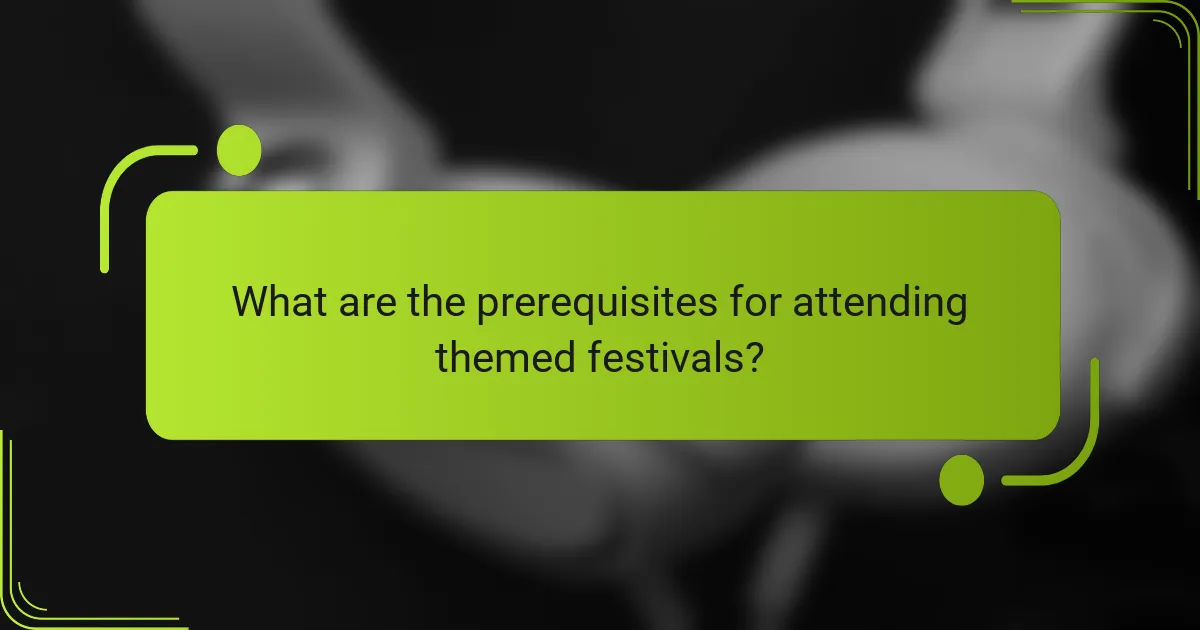
What are the prerequisites for attending themed festivals?
To attend themed festivals, you typically need to secure a ticket, understand the festival’s schedule, and be aware of any specific rules or requirements. Each festival may have unique prerequisites, including age restrictions, dress codes, or health guidelines.
Ticket purchasing and pricing
Tickets for themed festivals can vary widely in price, often depending on the festival’s popularity, location, and duration. Generally, you might find prices ranging from low tens of dollars for smaller events to several hundred dollars for major festivals with extensive lineups and amenities.
When purchasing tickets, consider the timing of your purchase. Early bird tickets are often available at a discount, while last-minute purchases may be significantly higher. Additionally, some festivals offer tiered pricing based on the level of access, such as general admission versus VIP experiences.
Be cautious of third-party ticket sellers, as they may charge inflated prices or sell counterfeit tickets. Always buy from official festival websites or authorized vendors to ensure a legitimate purchase.
